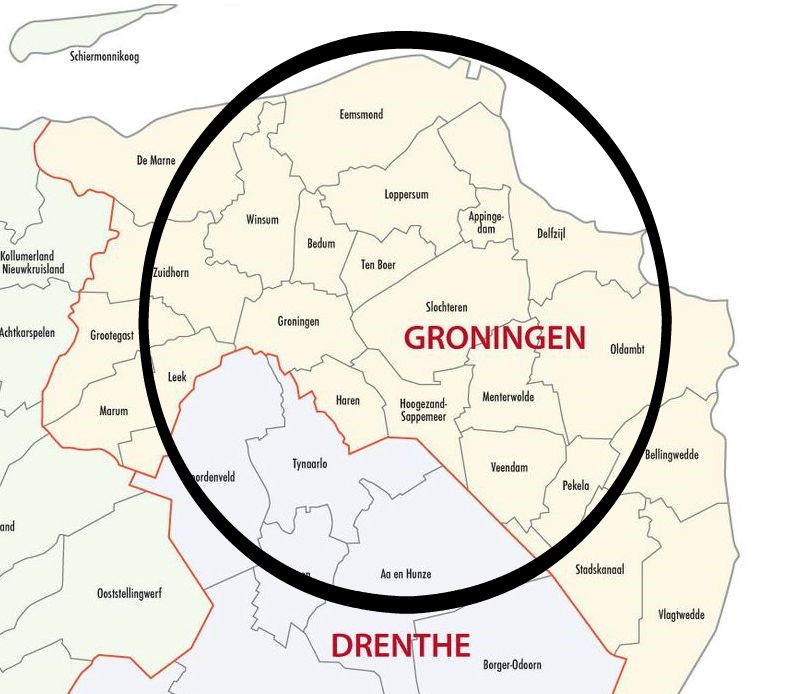Waardedaling woningen in aardbevingsgebied tot 2015 gemiddeld 9,3%

Woningen in het Groningse aardbevingsgebied zijn tot 2015 gemiddeld 9,3% in waarde gedaald. Dat concluderen promovendus Nicolás Durán en hoogleraar Ruimtelijke Econometrie Paul Elhorst van de Rijksuniversiteit Groningen. Zij analyseerden data van de Nederlandse Vereniging van Makelaars en Taxateurs (NVM) van alle verkochte woningen in de provincies Groningen, Friesland en Drenthe over de periode 1993-2014.
De impact van aardbevingen is gemeten aan de hand van een seismologisch model. Voor elke woning is nagegaan hoeveel centimeter per seconde aan grondtrillingen zij heeft ondergaan tot aan het moment van verkoop. Woningen die de meeste grondtrillingen hebben ondergaan (meer dan 25 cm/s) bleken tot 2015 met 27% in waarde te zijn gedaald. Ter toelichting: een voelbare aardbeving kent een grondtrilling van 0,5 cm/s. Woningen die net iets meer dan 4 cm/s aan grondtrillingen hebben ondergaan blijken met 1% in waarde te zijn gedaald. Daaronder is geen significant effect op de huizenprijzen vastgesteld. De gemiddelde waardedaling tot 2015 is 9,3%.
Omvang aardbevingsgebied veel groter
Het door de onderzoekers vastgestelde aardbevingsgebied blijkt veel groter dan het door overheid vastgestelde aardbevingsgebied, alsook groter dan het gebied dat als uitganspunt is genomen in eerdere beleidsstudies van Ortec Finance, CBS en de Atlas voor Gemeenten. Naast de meeste gemeenten in de provincie Groningen, vallen volgens Durán en Elhorst ook drie gemeenten in de provincie Drenthe binnen dit gebied. Elhorst: ‘De gemeente Groningen en de drie noordelijkste Drentse gemeenten behoren niet tot het door de overheid aangemerkte aardbevingsgebied. Maar wij tonen statistisch aan dat er in deze gemeenten ook sprake is van waardedaling door aardbevingen.’

Verband tussen waardedaling en schade
Tevens blijkt er een verband te bestaan tussen de waardedaling en het aantal fysieke schademeldingen tot 2015, concluderen de onderzoekers. Uit hun resultaten blijkt dat naarmate er minder schademeldingen zijn geweest in een gemeente de waardedaling kleiner is. Daarnaast was het in plaatsen met minder schademeldingen ook makkelijker om de woning te verkopen.
| Plaats | Schademeldingen | Verkochte huizen | Gemiddelde waardedaling |
|---|---|---|---|
| Loppersum | 3305 | 46 | 22,2% |
| Veendam | 335 | 122 | 5,0% |
| Leek | 25 | 7 | 2.0% |
Waardedaling grijpt als virus om zich heen
Durán en Elhorst zijn ook nagegaan wanneer de aardbevingsproblematiek begon te spelen. De eerste significante effecten op huizenprijzen zijn vastgesteld in 2009. Het betrof toen 321 woningen met een gemiddelde waardedaling van 3,0% boven een drempelwaarde van 7,5 cm/s aan grondtrillingen. Sindsdien heeft de aardbevingsproblematiek als een virus om zich heen gegrepen. De drempelwaarde is gedaald van 7,5 naar 4 cm/s, het aardbevingsgebied en daarmee het aantal getroffen woningen gegroeid, en de hoogte van de waardedaling gestegen.
Conjunctuur en krimp
Durán en Elhorst hebben hun resultaten gecontroleerd voor conjuncturele effecten en krimp. Bovendien hebben ze rekening gehouden met de manier waarop makelaars met hun klanten te werk gaan, waarbij de prijs van de ene woning wordt afgestemd op de prijs en de woning- en omgevingskarakteristieken van andere vergelijkbare woningen. Het feit dat voorgaande beleidsstudies naar de aardbevingsproblematiek hier geen rekening mee hebben gehouden is volgens de onderzoekers een van de redenen waarom de vastgestelde waardedaling in hun onderzoek hoger uitvalt dan dat in voorgaande beleidsstudies.
Meer informatie
- Contact: prof.dr. J.P. (Paul) Elhorst
- Download het volledige rapport

Meer nieuws
-
10 februari 2026
‘Regeneratie begint waar moed en verbeeldingskracht samenkomen’
-
09 december 2025
Zijn robots de oplossing?
